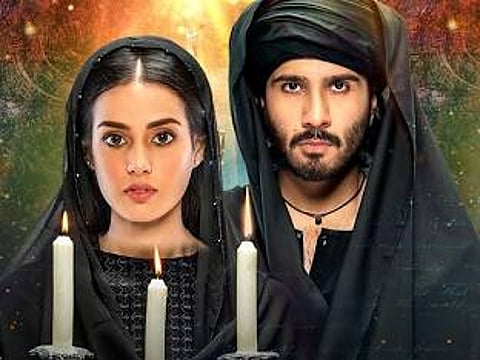Why 2011 pakistani drama ‘Khuda Aur Mohabbat’ is a romance that still works in 2025
The 2011 Geo series is based on Hashim Nadeem’s novel of the same name

Dubai: More than a decade has passed since Khuda Aur Mohabbat first aired on Pakistani television, but its themes of love, loss, and spiritual awakening continue to resonate deeply with audiences across the world.
The 2011 Geo Entertainment series, based on Hashim Nadeem’s novel of the same name, was not just a romantic drama—it was a poetic exploration of how love, when pure and selfless, can become a path to divine understanding.
Starring Imran Abbas and Sadia Khan in the first two seasons, Khuda Aur Mohabbat introduced viewers to Hammad, a privileged young man who abandons his life of comfort after falling in love with Imaan, the daughter of a conservative cleric. Their love is instant and intense—but forbidden. In his pursuit of Imaan’s acceptance, Hammad sheds his worldly ties and takes up a life of physical labor, only to find something even more powerful than love: spirituality.
This wasn’t your average boy-meets-girl tale. Hammad's journey into hardship was symbolic of a soul in search of meaning. Viewers watched him transform from a love-struck young man into a deeply spiritual being, all for a woman who was, in many ways, unattainable. Imaan, bound by her father's strict values, couldn’t love Hammad freely—and the story ended in heartbreak. Her death in Season 2 left Hammad paralyzed, physically and emotionally, a tragic conclusion that left fans devastated.
But the heartbreak wasn’t the end. In 2021, Khuda Aur Mohabbat returned with Season 3—a bold, visually rich reboot with new leads, Feroze Khan and Iqra Aziz.
This time, the story centered on Farhad and Mahi—two souls from starkly different worlds. Mahi, the daughter of a powerful political family, was carefree yet bound by tradition. Farhad, a small-town boy, became obsessed with her after a brief encounter. Though she didn’t reciprocate his intensity, Farhad’s heartbreak drove him to spiritual transcendence. His pain became prayer, his obsession became faith.
This spiritual-romantic theme is what sets Khuda Aur Mohabbat apart from most South Asian love stories. Here, love is not transactional, nor always returned—it’s a divine force that either uplifts or destroys. And that’s precisely why the series continues to find new fans in 2025.
The show’s aesthetic also played a role in its lasting impact. From the poetic Urdu dialogue and soulful soundtrack (especially Rahat Fateh Ali Khan’s haunting title track), to the lush cinematography of Season 3, Khuda Aur Muhabbat was visually and emotionally arresting. Every frame seemed to bleed with longing and loss, making it catnip for viewers craving intensity.
Beyond the aesthetics and performances, the series was a reflection of deeper questions: Is sacrifice the ultimate form of devotion? Is spiritual transformation ever truly complete without heartbreak?
In the age of binge-worthy thrillers and frothy rom-coms, Khuda Aur Mohabbat is almost radical in its seriousness. It demands you feel. That might explain its cult following—not just in Pakistan, but among Urdu-speaking audiences in India, the Middle East, and the global diaspora.
Now, more than ever, the series deserves a revival in pop culture conversation. Nostalgia for Hammad and Imaan’s tragic love story runs deep. Farhad’s pain-stricken eyes and poetic monologues remain meme-worthy. Fans continue to post edits, share quotes, and romanticize the intensity of unrequited love. It’s the perfect time for a hashtag resurgence: #KhudaAurMuhabbat, #FarhadAurMahi, and #IshqAurImaan could trend once more, if only fans—old and new—rally behind its message.
In a time when content is disposable and dramas come and go like social media trends, Khuda Aur Mohabbat endures. It may have started as a love story, but it ended up as a meditation on suffering, sacrifice, and the mysterious ways the divine manifests in human emotions.
And perhaps, that’s why we’re not done talking about it. We’re still haunted by Hammad’s grief. We’re still rooting for Farhad’s redemption. And we’re still captivated by the idea that true love, in all its pain and purity, might just be for the greater good.
Sign up for the Daily Briefing
Get the latest news and updates straight to your inbox





